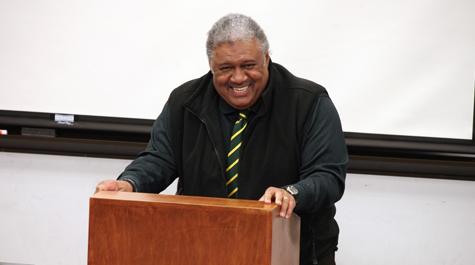Justice John Charles Thomas Delivers Passionate Speech on Persuasion
On Tuesday, March 3, Justice John Charles Thomas spoke to the Mediation Society as the final lecturer in the Science of Persuasion Speaker Series.
Thomas has the voice of a broadcaster, a sense of humor so great the entire room bursts into laughter whenever he cracks a joke, and a wealth of advice that all lawyers should have the opportunity to listen to.
In his discussion, he explained that lawyers can be persuasive through writing, speaking, body language, and attitude. He explained that all of these can be useful, but in different ways.
The Justice said that lawyers often don’t pay enough attention to their writing.
“The brief is the most intimate approach that you can make to a decision-maker,” Thomas said. “We take briefs home. We read briefs in bed sometimes. We actually sit by our fireplace with our children on our laps, and we take briefs on vacation. You can’t get closer to a judge than with a brief.”
The persuasion of speaking is crucial to adequate advocacy as well. Thomas stressed that a lawyer needs to convey a belief in what he or she is saying – whatever the argument, the lawyer must find a “place to stand.”
Although judges will have an idea of what the outcome of a case will be after reading the briefs, compelling arguments can change a judge’s mind. However, “that never happens in a case where the lawyer just gets up and reads his or her brief.”
From a judge’s perspective, a lawyer’s trustworthiness is key. If a lawyer misleads the judges, they will remember. In front of an appeals court, knowledge is equally as important. “For appellate practice, there is hardly an excuse for not knowing [something in the record],” he said.
Giving the students more insider tips, Thomas explained that just because a judge asks a hard question does not mean that the judge is against a lawyer.
“I just do that for fun,” he said. “I want to see how you operate, how you respond and what you say.”
Thomas was the first African-American and the youngest person (at age 32) to be appointed to serve on the Supreme Court of Virginia. At the time he was appointed, every other justice was over 50 years old. He is currently a member of William & Mary’s Board of Visitors and a Senior Partner in the Richmond office of Hunton & Williams. He also is a member of the Court of Arbitration for Sport in Switzerland, where he judges violations of the World Anti-Doping Code.
About William & Mary Law School
Thomas Jefferson founded William & Mary Law School in 1779 to train leaders for the new nation. Now in its third century, America's oldest law school continues its historic mission of educating citizen lawyers who are prepared both to lead and to serve.

